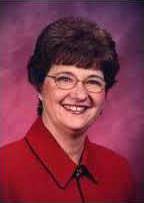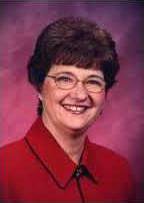Sally Cauble, District 5 board member of the Kansas State Board of Education, visited Great Bend June 5. She and Superintendent Tom Vernon led a focus group meeting at which the public was invited to weigh in on what qualities they felt the next Commissioner of Education should possess.
Attendance was small, consisting of a handful of concerned citizens and retired educators, and USD 428 board member Cheryl Rugan. They were invited to give examples of what they felt was good about public education in Kansas and what the critical issues are that the state faces in the future.
The list of pluses included the increased graduation rate, the quality and dedication of teachers, good teacher training, quality administrators, a solid funding formula in terms of equity, and the focus on College and Career readiness the state has adopted. There was some disagreement about local control, depending on the district the attendee came from. Rugan said she was pleased that the focus was turning back to more depth of education, rather than test-result oriented.
Critical issues brought more discussion. They included criticism of how technology has changed the way parents keep abreast of student progress, funding in general, younger aged children becoming behavioral problems, kindergarten preparedness, and distrust of Common Core.
One Dodge City parent described her frustration with her district’s switch from paper-based worksheets to tablet-based work. Her son attending middle school was assigned a tablet that must stay in school, and all school work is performed on the tablet, she said. In the past, when work was completed on paper, she could see what problems he struggled with, and could help him. Now, all she can see is the grade he received, but does not get to see the work, so she isn’t able to offer the same level of parental help.
“This is something we’ve never had brought to our attention before,” Cauble said.
A retired teacher commented on how in recent years, children in younger grades have been displaying defiant, uncooperative behavior that used to surface in middle school. She described first and second grade students refusing to do assignments, throwing items, and telling teachers they couldn’t make them do assignments, or that their parents would sue them.
“It’s really becoming a problem, and it steals time from the rest of the class,” she said.
Cauble said this was a common theme from the other focus groups. Some of the behavior could be the result of poor preparation for school.
“There are larger gaps going into kindergarten than ever before,” she said. Some kids are starting kindergarten before they demonstrate the proper level of physical development, fine and large motor skills and social and developmental skills.
The Dodge City parent expressed concern that Common Core standards required clarification, and did not believe they were developmentally appropriate for children, and that she had seen an increase in stress over tests among her children. However, others in attendance disagreed with her, and said testing had been much more the focus under the No Child Left Behind Act. States that opted to create a more rigorous plan or adopt Common Core standards were given a waiver from the requirements of NCLB.
Cauble and Vernon asked attendees to list qualities they felt important for KASB to ask for in the next Commissioner of Education. Vernon summed it up.
“The next commissioner needs to be a good communicator, primarily,” he said. The ideal candidate will be all things to all people.
Diane DeBacker, the most recent commissioner, resigned May 14 to take a position with the United Arab Emirates to serve as adviser to the director general of the Abu Dhabi Education Council. The KSBE will use results from focus groups to begin the search process for her replacement.
KSBE Cauble hears the good and the bad from patrons





